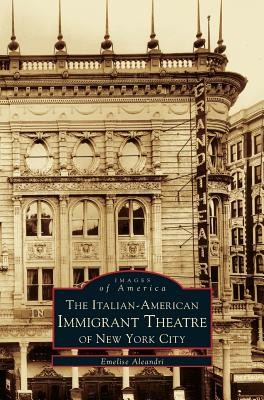
- We will send in 10–14 business days.
- Author: Emelie Aleandri
- Publisher: Arcadia Publishing Library Editions
- Year: 1999
- Pages: 130
- ISBN-10: 1531600638
- ISBN-13: 9781531600631
- Format: 17 x 24.4 x 1 cm, kieti viršeliai
- Language: English
- SAVE -10% with code: EXTRA
Italian-American Immigrant Theatre of New York City (e-book) (used book) | bookbook.eu
Reviews
Description
Italian-American theatre sprang to life in New York City shortly after waves of Italian immigrants poured into this country in the 1870's. The mass migration brought both the performers and the audiences necessary for theatrical entertainment. Hungry for recognition, support, and social exchange, the men and women from Italy formed amateur theatrical clubs as one way of satisfying emotional needs. By 1900, the community had produced the major forces that created the Italian-American theatre of the ensuing decades. In The Italian-American Immigrant Theatre of New York City, author Emelise Aleandri regenerates the excitement of the stage through striking photographs, programs, and other memorabilia generously loaned by families of the theatre community. She follows the fortunes of the earliest nineteenth-century companies and introduces those that arose in the twentieth-century. Within these pages are scenes of comedy, tragedy, vaudeville, and radio, featuring stars such as Mimi Cecchini, Guglielmo Ricciardi, Concetta Arcamone, Antonio Maiori, Rita Berti, Farfariello, and Olga Barbato.
EXTRA 10 % discount with code: EXTRA
The promotion ends in 23d.18:48:12
The discount code is valid when purchasing from 10 €. Discounts do not stack.
- Author: Emelie Aleandri
- Publisher: Arcadia Publishing Library Editions
- Year: 1999
- Pages: 130
- ISBN-10: 1531600638
- ISBN-13: 9781531600631
- Format: 17 x 24.4 x 1 cm, kieti viršeliai
- Language: English English
Italian-American theatre sprang to life in New York City shortly after waves of Italian immigrants poured into this country in the 1870's. The mass migration brought both the performers and the audiences necessary for theatrical entertainment. Hungry for recognition, support, and social exchange, the men and women from Italy formed amateur theatrical clubs as one way of satisfying emotional needs. By 1900, the community had produced the major forces that created the Italian-American theatre of the ensuing decades. In The Italian-American Immigrant Theatre of New York City, author Emelise Aleandri regenerates the excitement of the stage through striking photographs, programs, and other memorabilia generously loaned by families of the theatre community. She follows the fortunes of the earliest nineteenth-century companies and introduces those that arose in the twentieth-century. Within these pages are scenes of comedy, tragedy, vaudeville, and radio, featuring stars such as Mimi Cecchini, Guglielmo Ricciardi, Concetta Arcamone, Antonio Maiori, Rita Berti, Farfariello, and Olga Barbato.


Reviews